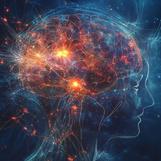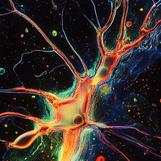Andrew Huberman
#Nutrition #Workout

Andrew David Huberman is an American neuroscientist and professor of neurobiology and ophthalmology at Stanford University School of Medicine. He is also the host of the popular podcast Huberman Lab, where he discusses topics related to neuroscience, health, and wellness.
Huberman's research focuses on brain development, neural plasticity, and the effects of vision on behavior and performance. He has made significant contributions to understanding how the brain can adapt and change throughout life. His lab is known for its innovative work, including using virtual reality to study visual system regeneration.
He holds a Bachelor of Arts in Psychology from the University of California, Santa Barbara, a Master of Arts in Psychology from the University of California, Berkeley, and a Ph.D. in Neuroscience from the University of California, Davis. Prior to his current position at Stanford, he was an assistant professor at the University of California, San Diego.
Updates from Andrew Huberman

Exercise doesn't just benefit the body—it's crucial for brain health too. Discover how different forms of exercise, from high-intensity sprints to resistance training, improve memory, cognitive flexibility, and long-term brain function. Learn the science behind how movement activates brain areas, boosts neurochemical release, and helps retain information. Explore practical tips to optimize your exercise routine for better brain health.

Unlock your brain's potential with neuroplasticity. Discover how focus and attention shape your neural connections, and learn practical tips to enhance your cognitive abilities.

In this episode of Huberman Lab Essentials, Andrew Huberman explores the science behind optimizing sleep, learning, and metabolism. Learn how morning light exposure, sleep patterns, and non-sleep deep rest enhance memory and performance. Understand the role of body temperature and exercise timing in boosting alertness and recovery. Discover how diet influences neurotransmitters and wakefulness.

Microplastics are found in everything from water bottles to canned foods, and their impact on health is concerning. While full data is lacking, studies show they may disrupt organs, hormones, and fertility. This article explores how microplastics affect our bodies and shares practical tips on reducing exposure, from avoiding plastic containers to using filtration systems, all while highlighting the need for more research into their long-term effects.

Dr. Terry Sejnowski, a leading computational neuroscientist, reveals how dopamine-driven algorithms shape motivation and learning. From boosting cognitive efficiency through exercise and sleep to integrating neuroscience with AI, this podcast offers actionable strategies for personal and professional growth. Learn practical tools for mastering skills, maintaining brain health, and adapting to future challenges in an ever-evolving technological landscape.

Discover the profound impact of hormones like testosterone on brain development and behavior, alongside the growing concern over endocrine disruptors such as phthalates and BPA. From childhood play patterns to fertility challenges, the article dives into how these chemicals affect our lives. Learn practical tips to minimize exposure, including safer cookware, natural products, and smarter food storage choices. Empower yourself with science-based strategies for better health.

Dive into the fascinating interplay between memory, focus, and mental health in our latest article. Uncover how intentional attention and neuromodulators like dopamine and serotonin influence memory retention and cognitive clarity. Learn about the impact of technology on our ability to concentrate and remember, and explore strategies to enhance focus by minimizing distractions. Additionally, discover the role of neuroplasticity in reshaping memories and improving mental well-being.

Learn how pregnancy and hormonal changes contribute to melasma and other skin conditions, and how supplements like polypodium can improve treatment. Delve into the science of sunscreen, highlighting the best options for blocking UV and visible light, as well as the potential dangers of chemical-based sunscreens.

Longevity science often highlights NAD precursors like NMN and NR for boosting cellular health, but do they truly extend lifespan? Dr. Peter Attia and Andrew Huberman delve into the data, discussing NAD's role, the impact of supplements, and FDA rulings. They emphasize that while supplements may offer minor benefits, lifestyle changes—exercise, sleep, and nutrition—are the true drivers of health and longevity. Dive into their analysis and learn why focusing on foundational habits matters most.

In our final newsletter edition, we summarize Dr. Matt Walker's insights on the biology of sleep, effective strategies to enhance sleep quality, and answers to your top sleep-related questions. From managing negative thoughts and finding the best sleep positions to understanding sleep patterns in older adults and menopause, get actionable tips to transform your nightly rest. Plus, learn about key supplements that can aid your sleep journey.